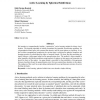Free Online Productivity Tools
i2Speak
i2Symbol
i2OCR
iTex2Img
iWeb2Print
iWeb2Shot
i2Type
iPdf2Split
iPdf2Merge
i2Bopomofo
i2Arabic
i2Style
i2Image
i2PDF
iLatex2Rtf
Sci2ools
119
click to vote
JMLR
2008
2008
Active Learning by Spherical Subdivision
We introduce a computationally feasible, "constructive" active learning method for binary classification. The learning algorithm is initially formulated for separable classification problems, for a hyperspherical data space with constant data density, and for great spheres as classifiers. In order to reduce computational complexity the version space is restricted to spherical simplices and learning procedes by subdividing the edges of maximal length. We show that this procedure optimally reduces a tight upper bound on the generalization error. The method is then extended to other separable classification problems using products of spheres as data spaces and isometries induced by charts of the sphere. An upper bound is provided for the probability of disagreement between classifiers (hence the generalization error) for non-constant data densities on the sphere. The emphasis of this work lies on providing mathematically exact performance estimates for active learning strategie...
Related Content
| Added | 13 Dec 2010 |
| Updated | 13 Dec 2010 |
| Type | Journal |
| Year | 2008 |
| Where | JMLR |
| Authors | Falk-Florian Henrich, Klaus Obermayer |
Comments (0)

